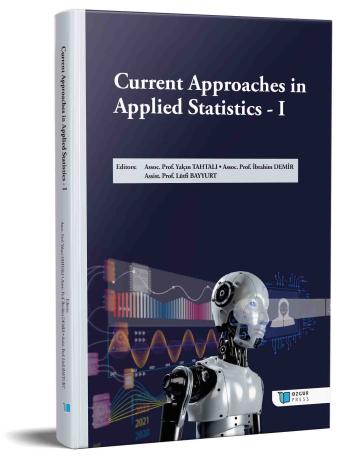
The Impact of Climate Variables on Wheat Yield in Turkey
Chapter from the book:
Tahtalı,
Y.
&
Demir,
İ.
&
Bayyurt,
L.
(eds.)
2025.
Current Approaches in Applied Statistics I.
Synopsis
In recent years, global warming and climate change have been affecting agricultural production both directly and indirectly. Rising temperatures, changing precipitation patterns, and extreme weather events have significant impacts on the yield of many crops. In Turkey, which is located in a semi-arid climate zone, this variability becomes even more pronounced. Staple cereal crops such as wheat are particularly sensitive to fluctuations in temperature and precipitation, and climatic anomalies occurring during critical growth stages can lead to substantial yield losses.This study aims to examine the effects of climate variables on wheat yield in Turkey. The dataset covers the period from 2004 to 2024. Wheat yield (Y, kg/ha) was used as the dependent variable, while climate-related independent variables (Xi) included temperature (°C), average precipitation (mm), the Southern Oscillation Index (SOI), and the Oceanic Niño Index (ONI). The SOI and ONI indicators employed in the study provide important parameters for understanding the impact of large-scale climatic oscillations on crop yields. In this context, ocean-atmosphere interactions such as the El Niño–Southern Oscillation (ENSO), which operate on a global scale, create significant regional and temporal variability in agricultural production.The results of the multiple linear regression analysis show that the model is statistically significant, with a high coefficient of determination (R² = 64.3%). Among the climate variables, temperature and SOI were found to be statistically significant. In particular, SOI was determined to have a strong and positive effect on wheat yield. The analysis results reveal that climate indicators play a critical role in wheat productivity. The findings of this study offer valuable insights for the development of sustainable agricultural policies and the formulation of adaptation strategies in response to climate change.

